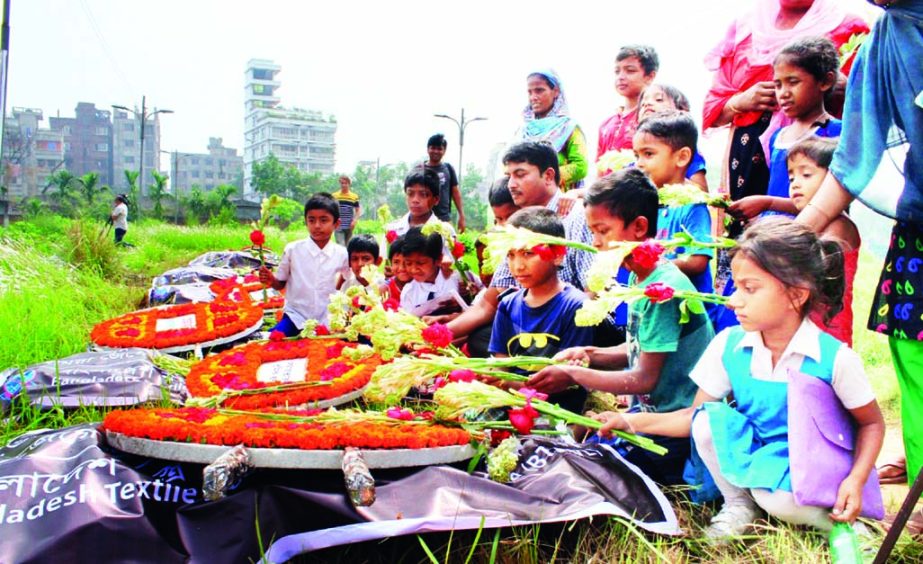
Staff Reporter :
Labor Safety Forum, a right group on Tuesday paid tearful tribute and staged protests demanding quick delivery of justice to victims of Rana Plaza tragedy assessment of compensation and awarding punishments to people responsible for the tragedy.
The forum leaders came up with the demand at a programme commemorating the victims of Rana Plaza collapse. It paid respects to the victims by placing floral wreaths at their graves at Jurain graveyard in Dhaka yesterday.
The Rana Plaza tragedy is the world’s worst industrial disasters, when a textile fctory complex collapsed and killed at least 1,130 people.
Several members of the forum including its convener Dr. Hamida Hossain, President of National Labor Alliance, Mejbah Uddin Ahmed, Honarary Executive Director of Bangladesh Legal Aid and Service Trust (BLAST) Sara Hossain addressed the programme.
The family members and relatives of the victim of Rana Plaza tragedy broke into tears and demanded capital punishment to Rana plaza owner Sohel Rana, and the guilty.
Md Enamur Rahman, member of Parliament from Savar, also placed wreaths at the site remembering the victims. A doa mahfil was held at Adhar Chandra High School field.
Several hundred people held photos of those unaccounted for since the collapse. About 3,500 workers were inside the complex making clothes for top western brands when tragedy struck.
More than 2,000 were injured in addition to the huge death toll.
But a murder trial in the case has been repeatedly delayed and no one has so far been convicted.
Abdul Awal, 58, visited the ruins in the Dhaka suburb of Savar to honour his 25-year-old daughter, Rozina Khatun. Her body has still not been found.
“She left an 11-month old son. Her husband got married again, leaving the son to us. Even after DNA tests on the bodies, I still have no trace of my daughter’s body,” said a tearful Awal, who comes from the northern rural district of Pabna.
“The boy does not have any memories of his mother. He doesn’t even have a grave to mourn.”
Police said some 500 people held demonstrations and marched on the highway in front of the ruins at the start of the day.
Others arrived as the day wore on, placing wreaths at the memorial and the unmarked graves of hundreds of workers whose mangled bodies were never identified.
Workers holding black flags placed wreaths and silently prayed at the graves.
Union leaders and survivors have expressed anger at the slow pace of the trial of Sohel Rana, whose family owned the complex which collapsed after it was illegally extended.
“We demand justice, We want Rana to be hanged. We want other criminals to be hanged,” workers chanted as they marched in front of the hole where the complex once stood. It has since become a pond covered with hyacinths.
“The injured workers have become the living dead. We demand the quick trial of the culprits. Five years have gone and yet there is hardly any progress in the murder trial,” said union leader Jolly Talukder.
Talukder also demanded the release of some $14.5 million, which, she said, was donated to a government fund to help Rana Plaza victims.
Survivors are still haunted by the collapse which trapped more than 2,000 people, some for days.
Sufia Begum, 36, was rescued after nine hours from inside sandwiched floors. She suffered broken vertebrae and ribs and now wears a steel corset.She no longer believes that justice will be served, but still travelled 330 kilometres (205 miles) from her village to pay respects to dead colleagues.
Fatima Begum came to the site with her five-year old granddaughter, who was born 21 days after her father died in the disaster. “I want my grandchildren’s future to be taken care of. We are ordinary people, we have been asking for the last five years,” she told media.
Others survivors recalled bitterly how reluctant employees were forced to work on the day of the disaster despite cracks appeared on the day in columns supporting the complex.
“It was cold-blooded murder,” said one.
The sector employs some four million workers but wages start at $65 a month, among the world’s lowest.
Groups which oversee safety upgrades say factories have improved since the tragedy. The 20 reported accidents in 2017 was the lowest number in recent years.
A group representing more than 100 European brands warned, however, that “major life-threatening safety concerns remain” among the country’s 4,500 textile plants.
Several foreigners representing international textile brands visited the memorial to pay respects to the dead workers.

